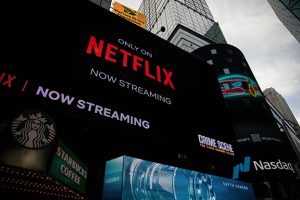Bloomberg
Netflix Inc shares are on course to lose about $40 billion in value on Wednesday after the streaming giant reported its first customer decline in more than a decade.
Shares in the company fell as much as 26% premarket trading, extending its plunge this year to 57%. If the losses hold, Netflix is poised to become the worst-performing stock this year in both the benchmark S&P 500 and tech-heavy Nasdaq 100 indexes.
The streaming service shocked Wall Street by losing 200,000 customers in the first quarter, the first time it has shed subscribers since 2011. It also projected it will shrink by another 2 million customers in the second quarter.
“A big problem with Netflix is that it’s too easy to leave the service,†said Russ Mould, investment director at AJ Bell. Consumers feeling the pinch from inflation will be looking hard at their expenses and streaming services are a quick way to save money.
Netflix’s stock has suffered this year as the pandemic-era surge in user sign-ups faded and investors turned impatient due to rising bond yields. In comparison, the S&P 500 is down 6.4%, while the Nasdaq 100 has declined almost 13%.
Fellow stay-at-home stocks, including Etsy Inc, Zoom Video Communications Inc and DocuSign Inc have also been hit by deep losses, down by 33% to 47% in 2022, as these businesses struggle to leverage the inroads they made during lockdowns.
Netflix said it would introduce a cheaper, advertising-supported option for subscribers in the next couple years, and will start to crack down on people sharing their passwords even before that. Netflix also will curb its spending on films and TV shows in response to the customer losses.
Investors, analysts and Hollywood executives had been bracing for the company to report a sluggish start to the year, but Wall Street still expected Netflix to add 2.5 million customers in the first quarter. The shares are already down more than 40% this year.
Netflix’s troubles are a warning sign for its peers and the competitors. After watching millions of customers abandon pay TV for streaming, US entertainment giants merged and restructured to compete with Netflix. Investors encouraged this strategic shift, boosting shares of companies like Walt Disney Co. that demonstrated a commitment to streaming.
Investors have begun to question whether some of these media companies will sign up enough customers to justify all the money they are spending on fresh programming. Disney fell as much as 5.2% in extended trading after Netflix reported its outlook, while Warner Bros. Discovery Inc., the owner of HBO Max, declined as much as 2.8%. Shares of Roku Inc., the maker of set-top boxes for streaming, dropped as much as 8.3%.
Netflix remains well ahead of most of its competitors outside the US, and is the largest streaming service in the world. The company believes it can execute its way out of the current predicament by luring new customers with better programs and finding more ways to charge its existing user base.
 The Gulf Time Newspaper One of the finest business newspapers in the UAE brought to you by our professional writers and editors.
The Gulf Time Newspaper One of the finest business newspapers in the UAE brought to you by our professional writers and editors.
